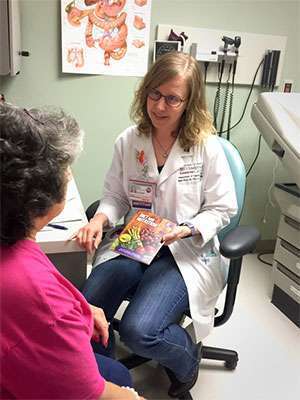
Editor’s note: It’s Pancreatic Cancer Awareness Month, and our focus is “Demand Better. For Patients. For Survival.” Each week, we’re bringing you conversations with survivors, families, volunteers, researchers, advocates and others fighting the world’s toughest cancer. We’re asking them why they Demand Better and what it means to them. Today, we’re highlighting Maria Petzel, RD, CSO, LD, CNSC, senior clinical dietitian at MD Anderson Cancer Center and a member of our Scientific and Medical Advisory Board (SMAB). Petzel is also a regular contributor to our Friday Fix blog, and she passed along some nutritional advice today, too!

Maria Petzel, RD, CSO, LD, CNSC, MD Anderson Cancer Center, Senior Clinical Dietitian, Pancreas Surgery Program and member of the Scientific and Medical Advisory board at the Pancreatic Cancer Action Network.
For whom do you Demand Better?
Patients and caregivers.
How are you Demanding Better in your work as a clinical dietitian?
I work with patients and caregivers to support them as they fight against pancreatic cancer. Outside of direct patient care, I Demand Better supportive care for patients by educating other healthcare professionals about nutrition and pancreatic cancer through professional writing and presentations.
What do you like most about serving on the SMAB?
It’s an honor to be a part of the SMAB. It gives me an opportunity to give back to an organization that has always been supportive of registered dietitians and that has recognized the important role nutrition can play for patients and their caregivers. I enjoy supporting the Patient Services team by updating educational materials, presenting educational webinars and contributing to the Friday Fix.

Petzel regularly shares PanCAN’s diet and nutrition booklet with a patients and caregivers.
How does diet and nutrition play a role in the treatment of pancreatic cancer?
Nutrition allows patients and caregivers an opportunity to play an active role in treatment of pancreatic cancer. Patients who are able to maintain weight and lean body mass are more likely to complete their prescribed dose schedule or treatments. They will also have fewer or less severe side effects and have a better quality of life. Many long-term survivors have lasting effects as a result of their pancreatic cancer surgery and treatment – ongoing nutrition care can help manage digestive issues and minimize risk of long-term nutrition deficiencies.
What is one piece of advice you tell patients who want to improve their overall nutrition?
Make the healthier choice. Whether it is a patient in treatment for cancer or a caregiver juggling work and caring for a loved one, we’re not always able to follow an ideal diet, and sometimes, you just have to make the healthier choice.
For example, eating fast food is not the healthiest, but if you are busy and you find yourself going through a drive-thru – choose a grilled chicken sandwich and a side salad rather than a burger and fries – that’s making the healthier choice.
For patients who find it hard to change their nutritional habits, how can they make that transition easier?
Break it up into steps; make one change a week. Also, forgive yourself when you “mess up.”
Join us in fighting the world’s toughest cancer. Visit pancan.org/demandbetter to learn more about how you can Demand Better during Pancreatic Cancer Awareness Month and beyond. Check out Friday Fix each week to learn the latest in diet and nutrition for pancreatic cancer.





